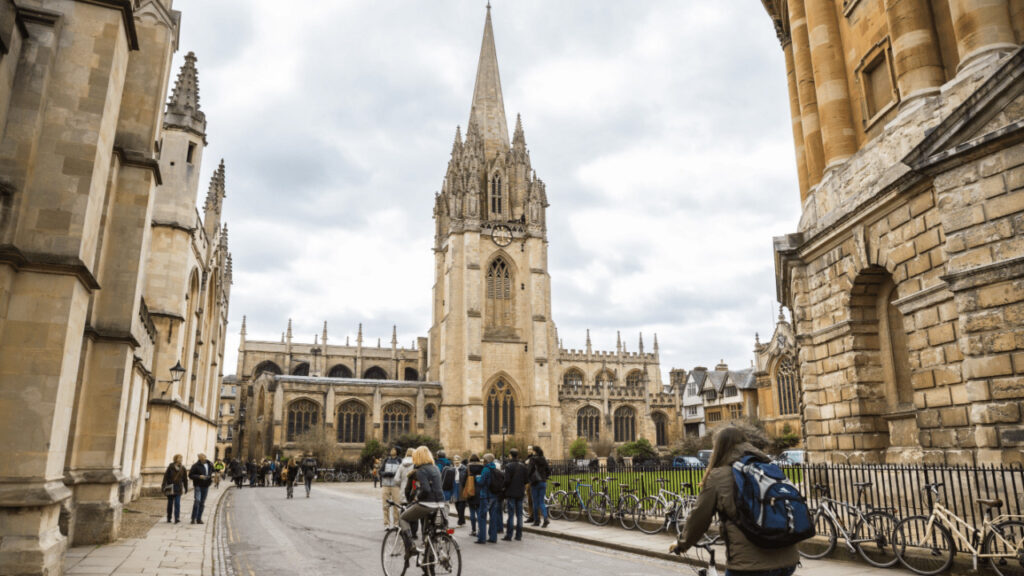I’m Jayesh Singh, a Data Analyst at The Telegraph, London, UK. I work for the commercial insights and analytics team, and I get to work with hundreds of terabytes of data every day.
Getting here as a business graduate from India took work. But it was worth every bit of the effort.
Today, I’ll share with you my journey from deciding to study abroad, then moving to the UK, and finding a job at one of the biggest media houses in the UK.
Why I Chose to Study Business Analytics in UK
My journey started as most journeys do – with a conflict. I had just graduated with a degree in Business Administration in 2020 and was faced with the most important question fresh graduates in India ask themselves: What do I do next?
Though the path ahead was not crystal clear, I knew I wanted to switch to a more quantitative course. Business administration is theoretical and qualitative in nature, which was nice, but this career path didn’t interest me anymore.
After some research and retrospection, I realised how much numbers and data excite me. I knew I wanted to pursue a career in Data Analytics.
Generally, if you want to pursue a master’s degree in Business Analytics in India, you need an undergraduate degree that is quantitative such as BTech, BSc in Math/Statistics or Computer Applications. Naturally, I had to look at my options abroad.
After more research, I discovered that the USA and the UK have the most top-ranking universities. Since I did not plan to settle abroad initially, the quality of education was my priority.
Eventually, I ended up choosing to study in the UK. The UK has more favourable policies for international students, and travelling to the rest of Europe is much easier.
Why I Chose University of Warwick
Here’s some important advice to begin with: once you have decided on a country, you must start looking for universities with a good chance of acceptance.
Though the UK generally accepts applicants from all sorts of academic backgrounds, there are universities where your application won’t hold any merit. In my case, competing with applicants from a quantitative experience wasn’t easy.
It’s important to find an intersection between your undergrad and postgrad degree. Otherwise, it’s challenging to get jobs. For instance, if you study a master’s degree in Computer programming after an undergraduate degree in English Honours, it would still make it very difficult for you to land jobs in tech.

Shortlisting universities can be arduous, especially if you’re doing it for the first time. It is essential that you go through the course structures in detail and be sure of the eligibility requirements.
You can also contact LeapScholar’s experts for guidance with university shortlisting and applications.
I applied to a good number of universities and received several acceptance letters. I chose the University of Warwick for many reasons. The university ranks #64 in the world, as per QS World University Rankings 2023, and is undoubtedly one of the best colleges in the UK.
My current work is very closely related to my academic discipline. The Business Analytics course was a one-year master’s course at Warwick. The course modules cover everything you need for your career in data analytics. Additionally, the university has a whole career support team to prepare you for the job market.

Want to Score 7+ IELTS Band in 4 Weeks?
5L+ students across India have signed up for Leap’s Masterclass to date.

Want to Score 7+ IELTS Band in 4 Weeks?
5L+ students across India have signed up for Leap’s Masterclass to date.
Meeting UK’s Eligibility Requirements
The primary requirement is always a consistent academic record. But UK universities value extra-circulars and personal achievements, so emphasise both in your application.
English proficiency test scores are compulsory for all university admissions in the UK. I went with IELTS, as all UK universities accept it. Whether you need coaching for IELTS or not depends on your comfort level with the language.
If you are applying right after your undergraduate degree, as I did, you probably would only have some of your mark sheets. In that case, your university will be happy to accept the mark sheets of the first few semesters that are available and extend a conditional offer.
The offer will state that you will be admitted to the university, provided you can produce your final mark sheets. Once your offer is final, the university will issue a Confirmation of Acceptance for Studies (CAS) letter.
A CAS letter is mandatory for a visa application, which typically takes a month, so prepare well in advance.
One thing that I did and would strongly urge you to do is talk to alumni from the university you’re applying to. They have been there, done that, and can give you valuable information about the university that is probably unavailable on the internet. Doing this gave me a better idea of how I could successfully achieve my admission goals.
Additionally, I would strongly recommend considering other proofs of competence, such as the GRE and GMAT. For example, at Warwick, a non-quantitative applicant can still compete for programmes like MSc Finance by scoring well in the GMAT exam, which makes up for the lack of quantitative education.
Preparing for the move
Moving to another country comes with significant changes and challenges. Thankfully, for me, the move was quite smooth. The only things you’d want to be prepared with beforehand are accommodation and payments/mode of transactions.
Accommodation: Living on or off campus depends on your preference. I needed to explore the university and connect with people on campus, so I chose to live there. But the choice is yours.
Living off-campus comes with its perks. You get to choose which area you want to live in and also choose your flatmates as well.
Remember, living off-campus requires more research. You should also talk to students from the university and get a sense of what worked for them.
Payments/Mode of transaction: In my opinion, forex cards are the best mode of transactions in the UK. Forex cards are bank cards and can be filled with the currency of your choice. It has better conversion rates and is guaranteed to work overseas.
You can also use your debit/credit card if they work internationally. But these cards can still show errors. The last thing you want is to be stuck overseas with a card that doesn’t work, so talk to your bank beforehand.
It’s best to have some cash in hand but keep a check on expenses because cash is harder to spend in the UK. I’d recommend carrying 150-200 pounds always for emergencies.
Exploring Career Prospects
The MSc in Business Analytics course covers mathematical, applicative, and programming modules such as Optimisation Models, Advanced Analytics, Data Management, Machine Learning and Analytics.
The career prospects for this course range across Data Analysis, Functional Analysis and consulting roles. You can also enter fields like Data Science, Data Engineering and Business intelligence.
The biggest advantage of Business Analytics is there will always be a demand for analysts in the market. Someone is always hiring.
Career opportunities will also depend on where you live. In a post-Covid world, most interviews are conducted online, so you have plenty of access to opportunities. But, metropolitan cities like London will always offer many more off-campus opportunities.
If you want to make money while you study, consider part-time jobs and internships. These are not the most meaningful jobs, but they pay well and can help you with your finances.
Some jobs you can apply to are ghostwriting, freelance work, part-time work at restaurants and cafes and more. Websites like Upwork and Payperhour are great for finding suitable part-time opportunities in the UK.
The Art of Job Hunting
The best way to land jobs is through networking. Identify early what job roles you’re interested in, and spend time making a list of companies you would like to work with. Then, ask for a reference! Once you’ve figured out this part, you can start connecting with people who already work there.

Easy way to find these people would be on LinkedIn. But of course, you should offer them a reason to recommend you. It is usually simpler if they are former students. When you’re connecting with these people, be genuinely curious. Hop on a 10-15-minute call, and ask as many questions as you can.
Along with Linkedin, attend various networking events. Some universities have alumni directories with email addresses you can use.
You can also use LinkedIn, Indeed and job portals to find relevant opportunities. If you plan to live in the UK, find companies to sponsor your work visa.
Cracking your Dream Job: CV & Interviews
Most job applications will require a CV and a cover letter. If you’re applying to a role with less than 7-8 years of experience, keep the education section at the top of your CV. Under that, list down the UK equivalent of all your grades.
In short bullet points, give an insight into what modules you have studied and list any co-curricular activities you may have participated in.
To list your work experience and internships, follow the Context Action Result (CAR) approach. Your work experience should be supplemented with: what the situation was, what you did do, and what came of it.
Support all the outcomes with quantifiable proof and use action verbs in descriptions. You can refer to Harvard’s list of action verbs for these words.
You can complete your CV with your skills, awards, and hobbies.
Final Thoughts
Overall, my experience of studying at the University of Warwick was remarkable. Studying abroad broadens your horizons in ways you don’t expect.
I loved socialising with people from different parts of the world, adapting to a whole new lifestyle and getting opportunities at a global level.
If you’re looking to start your journey abroad, LeapScholar is the perfect place. You can book a free call with Leap’s study abroad experts and learn more about how to get started.
Good luck!

















Have Questions? Get Guidance to reach your Dream University
Connect with India's finest counsellors and biggest study abroad community.